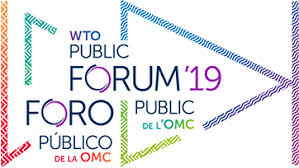What gives data value, and why does it matter for trade?
11 Oct 2019 02:00h
Event report
[Read more session reports from WTO Public Forum 2019]
Mr Cody Ankeny (Senior Manager of Policy, Information Technology Industry Council (ITI)) inaugurated the session by asking why data is valuable and by considering that countries, societies and companies are trying to understand the potential of data for trade and the digital economy. Data is nowadays equated to a natural resource and is considered by many as an enabler of economic growth. However, to what extent the benefits of such growth are equally shared among all is still under dispute.
Mr Stephen Ezell (Vice President, Global Innovation Policy, Information Technology and Innovation Foundation (ITIF)) presented some figures on the growth of the digital economy. He said that the digital economy contributes to 25% of the global gross domestic product (GDP) and that cross-border data flows increased by 45 times from 2005 to 2015. This year, for the first time, the value generated by the international data flow has overcome the value of the international merchandise trade. ‘We should be as concerned about moving bits as we are about moving items’ he stated. Ezell then explained the unique factor that characterises data. Data is a non-rivalrous resource: multiple enterprises or citizens can collect, share and use the same data simultaneously. Moreover, data can be exported to another country without any loss in value. Data’s greatest impact arises when it is combined with other data. He then presented concrete case studies showing that crucial role played by data in the manufacturing sector where it is transforming the industrial supply chain: the manufacturing competition depends upon the ability to leverage data flows to synchronise global supply chains. He concluded his presentation by setting forth some recommendations for policymakers: since data provides an essential innovation platform, governments should refrain from taxing the use of data, from defending data localisation requirements, and therefore encourage the free flow of data.
Mr Santiago Wills (Ambassador, Permanent Representative of Colombia to the WTO) presented on Colombia’s digitalisation policies. In the past 8 years, the government has been focusing on the implementation of numerous digitalisation and open government programmes. For example, the Ministry of Information and Communications Technologies (MinTIC) has implemented the ‘Live Digital Plan’ promoting the massification of the Internet in the country by reaching municipal connectivity in most of the cities. Another example includes regulatory efforts to modernise the entire ICT sector to promote public and private investment as in the case of the ICT Modernisation Act. He then illustrated the main pillar driving Colombia’s economic policy: the orange economy. It consists of investing in the creation of content, thus supporting ‘the creative economy and the creative industries’. The orange economy comprises three different categories of industries: those producing traditional artefacts (e.g. books, newspapers), those producing experience-based works (e.g. visual and performing arts), and those producing technology-based products (e.g. video games, software, etc). He concluded his presentation by stating that Colombia is welcoming the WTO e-commerce negotiations as data flows are closely linked to economic development.
Mr Jun Nakaya (Chair, JEITA Trade Policy Committee, Fujitsu) welcomed the WTO’s e-commerce negotiations because ‘rules are needed to create certainty in the digital economy’. He explained that data will play a crucial role in creating society 5.0 and in fostering innovation. Digital products are prevailing in all sectors of society and especially in the business world. He illustrated the case of a company relying on cross-border data flows and using agricultural big data to stimulate crop growth, to accurately predict yields, and to formulate ideal harvesting schedules. By reproducing a field in cyberspace, yields and ideal harvest time can be predicted accurately from the first year without requiring long-term data accumulation. He concluded his presentation by stressing the importance to achieve a comprehensive agreement on e-commerce facilitating cross-border data flow and including a prohibition of Internet tariffs on electronic transmission, of data localisation requirements and source codes disclosure.
Mr Bertrand Deprez (Vice President, EU Government Affairs, Schneider Electric) stated that at Schneider Electric data is used to create value for society. He considered that data helps people to have a better understanding of the context around a product or a service and it helps improve the sustainability and efficiency of the production processes. Data’s value increases when it is shared: ‘the more you share data the more you could extract value’. He also specified that discussions supporting the free-flow of data among borders should also encompass intellectual property rights and privacy considerations: data can improve the delivery of services but it belongs to customers. He continued that in the future data will be generated by business-to-business (b2b) devices thus raising the importance of addressing the issue of interoperability and compatibility of such devices. He concluded his presentation by affirming that there is a need to build a framework at the global level to regulate cross-border e-commerce and addressing the monetisation models behind the use of data.
The moderator launched a panel discussion on the analogy between the use of data and the exploitation of natural resources. All the panellists agreed that although data can be intuitively compared to oil there are many differences between the two. First, data is an infinite resource and it is an additive one: the more it is analysed the more information can be extracted. Second, data can also be replicated, combined and analysed simultaneously. Third, data is indeed a source of value but it is different from traditional commodities because it can be purchased without any externalities and its value depends on the use.
Related topics
Related event

